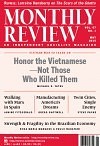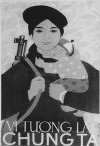Imperialism

The Hidden Structure of Violence marshals vast amounts of evidence to examine the costs of direct violence, including military preparedness and the social reverberations of war, alongside the costs of structural violence, expressed as poverty and chronic illness. It also documents the relatively small number of people and corporations responsible for facilitating the violent status quo, whether by setting the range of permissible discussion or benefiting directly as financiers and manufacturers. The result is a stunning indictment of our violent world and a powerful critique of the ways through which violence is reproduced on a daily basis, whether at the highest levels of the state or in the deepest recesses of the mind. | more…

As we write these notes in March 2015, the Pentagon’s official Vietnam War Commemoration, conducted in cooperation with the U.S. media, is highlighting the fiftieth anniversary of the beginning of the U.S. ground war in Vietnam, marked by the arrival of two Marine battalions in De Nang on March 8, 1965. This date, however, was far from constituting the beginning of the war. The first American to die of military causes in Vietnam, killed in 1945, was a member of the Office of Strategic Services (a precursor of the CIA). U.S. intelligence officers were there in support of the French war to recolonize Vietnam, following the end of the Japanese occupation in the Second World War and Vietnam’s declaration of national independence as the Democratic Republic of Vietnam. The French recolonization effort is sometimes called the First Indochina War in order to distinguish it from the Second Indochina War, initiated by the United States. In reality, it was all one war against the Viet Minh (Vietnamese Independence League). By the time that the Vietnamese defeated the French at Dien Bien Phu in 1954, the United States was paying for 80–90 percent of the cost of the war. | more…

In a letter to Vietnam War veteran Charles McDuff, Major General Franklin Davis, Jr. said, “The United States Army has never condoned wanton killing or disregard for human life.” McDuff had written a letter to President Richard Nixon in January 1971, telling him that he had witnessed U.S. soldiers abusing and killing Vietnamese civilians and informing him that many My Lais had taken place during the war. He pleaded with Nixon to bring the killing to an end. The White House sent the letter to the general, and this was his reply.… McDuff’s letter and Davis’s response are quoted in Nick Turse’s Kill Anything That Moves: The Real American War in Vietnam, the most recent book to demonstrate beyond doubt that the general’s words were a lie.… In what follows, I use Turse’s work, along with several other books, articles, and films, as scaffolds from which to construct an analysis of how the war was conducted, what its consequences have been for the Vietnamese, how the nature of the war generated ferocious opposition to it (not least by a brave core of U.S. soldiers), how the war’s history has been whitewashed, and why it is important to both know what happened in Vietnam and why we should not forget it. | more…
An Integral Component and Driving Force of Imperialism in the Phase of Monopoly-Finance Capitalism
According to Michał Kalecki, the imperialist system of the Keynesian era rested on a triangular structure that was composed of (a) state-financed military production (i.e., the military-corporate complex, often called the “military-industrial complex”), (b) media propaganda (media-corporate complex), and (c) a putative full-employment/welfare-oriented superstructure (Keynesianism) underpinned by the war machine, serving to justify it. Building on Kalecki’s work, John Bellamy Foster, Hannah Holleman, and Robert W. McChesney provided an updated version of the theory of imperialism of the monopoly-capital tradition by laying emphasis on the primary role of the above triangle in the restructuring and preservation of the contemporary imperialist system.. Expanding on their work, I argue that one of the most significant changes in the triangular structure of contemporary imperialism is in its third pillar, particularly with the abandonment of the welfare-oriented paradigm and the adoption of the neoliberal globalization project. | more…
C.L.R. James's Early British Years
Christian Høgsbjerg, C.L.R. James in Imperial Britain (Durham: Duke University Press, 2014), 294 pages, $24.95, softcover.
The London Times once referred to the famed Trinidad-born C.L.R. James as a “Black Plato.” When asked about the phrase, James elliptically deflected it with a graciousness that should be noted, but the problems with being able to conceive of black intellect only within parallels within Western thought could take up pages. Christian Høgsbjerg’s new biography of James focuses on his first years in Britain, from 1932 to 1938, and skillfully avoids either fetishizing his subject or reducing him to a glorious “black brain.” The result is a riveting history that is bound to awaken the interest of those unfamiliar with him and add a dimension to what others already know of his life and work. | more…
The media compelled all of us to follow closely both the Scottish referendum of September 2014 and the conflict between Russia and Ukraine that took on increased momentum starting in spring 2014. We all heard two opposing stories: the unity of Great Britain must be protected in the interest of the English and Scottish people. Moreover, the Scots freely chose, through a democratic vote, to remain in the Union. In contrast, we were told that the independence of Ukraine, freely chosen by the Ukrainian people, is being threatened by the Great Russian expansionist aims of the dictator Putin. Let us look at these facts that were presented to us as incontrovertibly obvious for a good-faith observer. | more…
The American continent was the first region to be integrated into newborn global capitalism and to be shaped into a periphery of the European Atlantic centers, themselves still undergoing formation. That shaping was a process of unparalleled brutality. The English, just as they did in Australia and New Zealand, proceeded immediately to the total genocide of the indigenous population. The Spaniards reduced them to a state of virtual slavery that, despite its catastrophic demographic effects, did not efface the Indian presence. Both, along with the Portuguese and the French, finished shaping the continent with the slave trade. The exploitation of this first periphery of historical capitalism was based on setting up a system of production to export agricultural (sugar, cotton) and mineral products.… Independence, when gained by the local white ruling classes, did not change that setup. Latin America (with today a mere 8.4 percent of world population) and Africa have small populations, relative to East, South, and Southeast Asia, but are endowed with fabulously rich natural resources (in mineral deposits and potentially arable land). For that reason those regions were doomed to remain subject to systematic grand-scale pillage, exclusively for purposes of capital accumulation in the dominant centers—Europe and the United States. | more…
Multitude or Generalized Proletarianization?
The term multitude was first used in Europe, it seems, by the Dutch philosopher Spinoza, to whom Michael Hardt and Antonio Negri explicitly refer. It then designated the “common people” who were a majority in the cities of the Ancien Régime and deprived of participation in political power (reserved for the monarch and the aristocracy), economic power (reserved for property owners of feudal ancestry or for the nascent financial bourgeoisie, both urban and rural—including the rich peasants), and social power (reserved for the Church and its clerics). The status of the common people varied. In the city, they were artisans, small merchants, pieceworkers, paupers, and beggars; in the country, they were landless. The common people in the cities were restless and frequently exploded into violent insurrections. They were often mobilized by others—particularly the nascent bourgeoisie, the active component of the Third Estate in France—in their conflicts with the aristocracy. | more…
Recovering Histories of Internationalism
Judy Tzu-Chun Wu, Radicals on the Road: Internationalism, Orientalism, and Feminism during the Vietnam Era (Ithaca: Cornell University Press, 2013), 346 pages, $26.95, paperback.
The cover of Judy Tzu-Chun Wu’s Radicals on the Road features a sepia-toned photograph of Eldridge Cleaver raising his fist in a Black Power salute behind three Vietnamese women in combat helmets, one of whom is kneeling behind an anti-aircraft gun. While you have probably seen a similar photograph of Jane Fonda from her North Vietnam trip in 1972, images like that of Cleaver are less common, if circulated at all. In this second book by Wu, she documents three sets of journeys, like Cleaver’s, that have remained at the margins of both the scholarship and the popular memory of the antiwar movement. | more…
Ervand Abrahamian, The Coup: 1953, the CIA, and the Roots of Modern U.S.-Iranian Relations (New York: New Press, 2012), 304 pages, $26.95, hardback.
The Cold War between the Soviet Union and the United States began in earnest as soon as the Second World War ended, shaping most of the remainder of the twentieth century. The U.S. doctrine of “containment” required confronting the Soviets at every point of contact, accompanied by the claim that lasting peace could be reached only through the establishment of an international order based on national states which enjoyed a U.S.-defined political liberty and a capitalist economic order. The Soviets bolstered their security through providing support to countries seen as friendly and close to their borders. Therefore, maintaining influence in Iran was a goal of Soviet foreign policy in the Middle East. U.S. foreign policy was shaped by its own state interests and ideology and driven by the American postwar, worldwide systems of military bases.… It is this turbulent period of geopolitical maneuvering that Ervand Abrahamian’s The Coup revisits. Yet, unlike other books on the 1953 events in Iran, Abrahamian locates the U.S.-backed coup less in the Cold War ideological confrontation between East and West than in the conflicts which opposed imperialism and nationalism; between the center of world capitalism and the underdeveloped economies heavily dependent on exporting raw natural resources. | more…
France and the United States
To support the “war on terrorism,” the concept of war has been introduced into the criminal code of all Western countries. This is the first step on the way to a merger between criminal law and the law of war. Massive spying by the secret services of a country on its citizens has today become the norm. The Snowden revelations on the operations of the NSA have only brought to light a widespread surveillance that is already legalized.… Despite the prominence given to the practices of U.S. intelligence agencies and the resulting indignation in France, the French parliament just adopted a military planning law that includes measures allowing practices similar to those of the NSA, specifically massive spying by intelligence agencies on citizens. | more…
The Grass-Roots Struggle Against the Oil Plunder in Iraq
Greg Muttitt quotes an Iraqi friend who pointed out that there would be two phases to the war in Iraq: first the U.S. invasion and occupation, and second the struggle over the gas and oil. Ten years after tanks rolled across the border from Kuwait, the second phase continues.… There is still no oil law, which the United States has pushed hard to get passed since 2007 and the Iraqi Parliament has no desire to pass soon. This means that the oil rush by the multinational oil companies goes on in a legal vacuum. While the international press blames sectarian strife for holding up the law, it is, in fact, due to a broad people’s struggle for sovereignty. | more…


